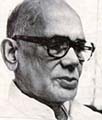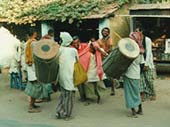
The Rediff Special/B G Verghese
The calendar over the years has been marked by massacres,
brutal revenge killings, armed violence and grief
Where did things go wrong?
 Bihar falls into three regions. North Bihar is the poorest, least
urbanised and among the most backward parts of India. Its population density
is second only to Kerala. Being North of the Ganga,
or Ganga paar even now it remains relatively
isolated and lacking in connectivity and infrastructure.
Bihar falls into three regions. North Bihar is the poorest, least
urbanised and among the most backward parts of India. Its population density
is second only to Kerala. Being North of the Ganga,
or Ganga paar even now it remains relatively
isolated and lacking in connectivity and infrastructure.
Bihar's first bridge across the Ganga at Mokameh only came in the 1960s.
The Joint Steamer Companies and, more important, the services
they ran, folded up adding to North Bihar's isolation. Hydraulically
part of Nepal, it suffers from poor drainage, recurrent floods
and steadily worsening land hunger.
The Koshi, Bihar's River of
Sorrow, had over the past century migrated 110 kilometres west
in a great sub-montane deltaic fan, laying waste a huge swathe
of land. The river was not controlled until anchored by the Hanuman-
nagar barrage at the Nepal border and jacketed within flood embankments
in the early 1960s.
The Chota Nagpur plateau and the Santhal Parganas are drought-prone
and mineral-rich but still have some excellent forests. This is
an area of tribal concentration and is the center of the Jharkhand
movement. It was blighted by reckless and unscientific coal mining
by scores of private interests before coal nationalisation, causing
subsistence and underground fires. Significant areas of Bihar
still burns.
Finally, there is South Bihar, the Magadh of old. This lies partly
in a rain shadow and fringed by the Kaimur plateau, another area
of neglect. It has fertile land and better regulated water supplies
which has made landowners more rapacious and oppressive of agricultural
labour. But South Bihar is more exposed to outside influenceswhich is perhaps why it has seen a somewhat greater degree of
organisation of the rural poor and more agrarian unrest than elsewhere.
The rot started in Bihar early even if the outward manifestations
took time to show. The root problem that overshadows everything
else is caste encrusted with stubborn feudalism embedded in higher
caste land ownership. This has plagued agrarian relations which
has in turn resulted in conditions close to serfdom over wide
areas, rising violence and low productivity. Despite the Champaran
andolan, the Bihar peasant continues to suffer from very
inequities land relations.
Little has changed in 80 years except
that the worm has turned. The oppressed are today socially and
politically conscious. They are getting more organised and are
striking back, especially in South Bihar. Every caste has its
own armed senas. The pecking order has changed with the
upper crust of the intermediate castes, Yadavs, Kurmis and Keoris,
breaking into the power structure that was once the sole preserve
of the upper castes.
The weakest have come under Naxalite-Maoist
influence. The calendar over the years has been marked by massacres,
brutal revenge killings, armed violence and grief. Remember Belchi,
Pipra, Parasbigha, Ambari and Arwal, to name only some eruptions.
This is the stuff of Bihar politics which has been hugely corrupted
and criminalised. Recall the Dhanbad coal mafia, an urban counterpart
to rural gangsterism rooted in theft and violence.
 The situation was sufficiently bad by the late 1960s to persuade
the Union home ministry to undertake a study of agrarian relations.
This indicated that unless something was done soon, the Bihar
countryside, far from witnessing a green revolution, might turn
red with blood. The warning was not heeded. Another team was dispatched
to survey the scene in seven troubled districts of South Bihar
in 1988. As a result, Operation Siddhartha was launched to restore
rural peace through land distribution and by ensuring payment
of statutory minimum wages which were only being enforced in 140
out of 847 villages in Jehanabad for lack of labour inspectors!
The situation was sufficiently bad by the late 1960s to persuade
the Union home ministry to undertake a study of agrarian relations.
This indicated that unless something was done soon, the Bihar
countryside, far from witnessing a green revolution, might turn
red with blood. The warning was not heeded. Another team was dispatched
to survey the scene in seven troubled districts of South Bihar
in 1988. As a result, Operation Siddhartha was launched to restore
rural peace through land distribution and by ensuring payment
of statutory minimum wages which were only being enforced in 140
out of 847 villages in Jehanabad for lack of labour inspectors!
Mr Verghese's comments form part of the Kedar Nath Singh Memorial
Lecture which he delivered in Chhapra, Bihar, recently.
Don't miss what B G Verghese has to say tomorrow!
Tell us what you think of this article
|



